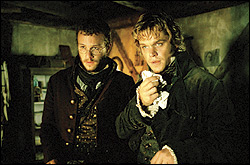My reactions to The Brothers Grimm (which opens Friday, Aug. 26, at the Metro and other theaters), the big-time comeback of Terry Gilliam, are so contradictory that I must present my review as an argument between the Brothers Tim: dueling sides of my sensibility—one an idealistic auteurist critic, the other a hardnosed Hollywood realist reporter. (That’s pretty much been the story of Gilliam’s career: the clash between his art and the studio’s business sense.) This sibling rivalry approximately corresponds to the one in the movie between dreamy, romantic Jacob Grimm (Heath Ledger) and cynical, money-grubbing Wilhelm Grimm (Matt Damon), who roam war-torn Germany circa 1812, casting out evil spirits who are actually their henchmen in disguise, using magic tricks that are just cheesy illusions. They pocket the grateful villagers’ chump change, then ride off to con the next ignorant burg. Naturally, one day they’re hired to vanquish a supernatural menace that’s real: the 500-year-old Mirror Queen (Monica Bellucci), whose minions snatch village children for unspeakable rituals. Wilhelm thinks superstition is a business opportunity, but Jacob yearns to believe in magic.
Auteurist Tim: This is the worst movie Terry Gilliam has ever made! Because it doesn’t even look like he made it. Where’s the personal stamp? It’s just a straightforward fairy tale with dutiful nods to Little Red Riding Hood, Hansel and Gretel, and the other stories collected by the real Grimms (who were actually scholars). The Brothers Weinstein forced Gilliam to hire the empty cutie Lena Headey instead of brilliant Samantha Morton as the brothers’ love interest. They fired his longtime cinematographer and forbade him to put a nose prosthesis on Damon to subvert his matinee-idol beauty. When he uglified Brad Pitt in 12 Monkeys, it was a hit! And Monkeys expressed his unique personality, the test of great cinema.
Hollywood Tim: Tim, you ignorant slut. This is the best movie Terry Gilliam ever made, because he didn’t get to make it his way—as an overpriced, incoherent jumble of ideas. His mind is like the drawers he used to have on the Python show, crammed with photos of noses and butts, buildings and skies, which he’d slap together at the last minute with no story sense. He needs somebody to curb his anarchy: co-director Terry Jones on The Holy Grail; co-writers Michael Palin and Sean Connery on Time Bandits; co-writer Tom Stoppard on Brazil. He wants a film with no structure, so he can change everything impulsively as he goes along, crafting an elaborate, disconnected series of skits. Remember the 2000 documentary Lost in La Mancha, about his unfinished Don Quixote film? He blamed the disaster on bad weather and bad breaks, but his ideas were obviously a mess. Grimm is $80 million intelligently spent.
Auteurist Tim: Only in bits and places. Grail fans will love the mucky peasant-village milieu and the way Jonathan Pryce, as the snooty French governor who oppresses the Germans and hunts the Grimms, farts in the general direction of French dignity. Peter Stormare’s character, a comic Italian torn between his boss (Pryce) and the witch-busting Grimm brothers, has a bit of Gilliam’s trademark pratfall style. And the enchanted woods are as creepy as the fairy tales they keep alluding to; the walking trees are like Ents on meth. A child made of mud steals a real child’s face; a horse gobbles people up; the queen morphs from corpse to pinup, and shatters like glass. Even though they made Gilliam tell a satisfyingly resolved story with truly heroic heroes, character arcs, romance, and moral values (yecch!), Grimm still has hints of his hallmark style: a screen crowded in the manner of Brueghel, had Brueghel been employed by Gilliam’s first boss, Mad magazine’s Harvey Kurtzman.
Hollywood Tim: So you agree that it’s a good movie! And that budget constraints liberate the auteur’s genius, instead of hobbling it.
Auteurist Tim: Fuck you, Tim! If Gilliam had had his way, this movie would’ve been as enchanting as the first Harry Potter movie—which J.K. Rowling wanted Gilliam to direct, but the studio bastards said no! Here, the Weinsteins made him sign a contract forbidding him to reveal their machinations. They wouldn’t even let him give himself and his writing partner a writing credit, so he mischievously took credit as “Dress Pattern Maker.” Everything good about the film is what Gilliam’s cracked anarchy brings to it—when the Weinsteins weren’t looking.
Hollywood Tim: Yet you’ve got to admit the flaws are Gilliam’s, too. He identifies with the rebel dreamer Jacob, so realist Wilhelm gets short shrift. Ledger’s performance is good, and Damon’s sucks. And Gilliam still can’t direct women—Headey is badly written and as badly directed as Kim Greist in Brazil (for which, ironically, he opted to hire the pretty unknown instead of the respected actress, Ellen Barkin). And he would’ve turned Harry Potter into shapeless goo. Grimm is messy enough to be his, but orderly enough to be complete.
Auteurist Tim: Do you want to carpool on the way home?








